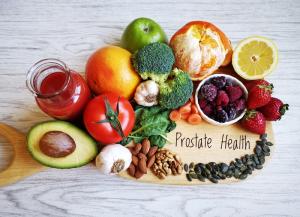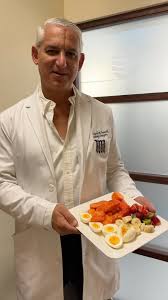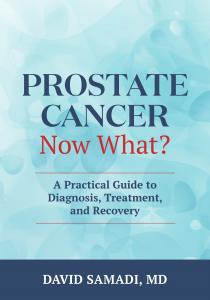Dr. David Samadi Offers Guidance on Foods and Beverages That May Influence Prostate Symptoms of BPH and Prostatitis

A healthy prostate starts on your plate—whole, anti-inflammatory foods can play a powerful role in reducing symptoms and protecting long-term men’s health

Food is medicine. When men prioritize nutrition, they don’t just feel better—they lower their risk for prostate issues and take control of their long-term health
NYC urologist reveals the common foods and drinks that may be silently worsening prostate symptoms—and what to eat instead for better comfort and urinary health
“Many men don’t realize the impact their morning coffee or evening glass of wine might be having on their prostate,” said Dr. Samadi. “Small, everyday choices can quietly aggravate symptoms like frequent urination and inflammation.”
Caffeine and Alcohol: Popular but Problematic
Dr. Samadi points to caffeine as a top culprit. Found in coffee, energy drinks, and even some teas, caffeine acts as a bladder stimulant that can worsen urinary urgency and nocturia (waking at night to urinate).
“Any man getting up multiple times during the night and drinks caffeinated beverages could suspect caffeine may be partly to blame,” he explained. “Even cutting back slightly—like switching to half-caf or caffeine-free herbal teas—can offer some relief.”
Alcohol intake is another major concern. “Alcohol has a diuretic effect, meaning men will experience increased urination,” said Dr. Samadi. “It also contributes to dehydration and inflammation—two things men will want to avoid when managing prostate health.”
Spicy Foods and Processed Fare: Double Down on Inflammation
Men who enjoy bold flavors should also take note. Spicy dishes may increase urinary tract irritation and intensify prostatitis symptoms.
“For some men, spicy meals are a recipe for regret,” Dr. Samadi said. “It’s worth experimenting with mild seasonings like turmeric or ginger, which are flavorful and anti-inflammatory.”
He also warns against processed and fried foods, which often contain trans fats and excess sodium—both known to increase systemic inflammation. “Chronic inflammation is not a friend when it comes to prostate health,” Dr. Samadi emphasized.
Dairy and Red Meat: Moderation is Key
While dairy products can offer nutritional benefits, they may worsen inflammation in some men with chronic prostatitis. “Not everyone needs to cut dairy completely,” said Dr. Samadi, “but if your symptoms flare after consuming it, consider switching to plant-based alternatives.”
The same goes for red and processed meats. “Saturated fats and high-heat cooking methods can increase inflammatory compounds in the body,” Dr. Samadi noted. “Choose leaner cuts like top sirloin or round steak, and mix in more plant-based or omega-3-rich proteins like fish.”
Artificial Sweeteners and Carbonated Beverages: A Lesser-Known Trigger
Sodas and artificially sweetened drinks pose a dual threat to prostate comfort. They can irritate the bladder lining and potentially increase inflammation.
“Men sipping soda all day, should consider switching to water with lemon or cucumber,” Dr. Samadi advised. “It’s a simple swap that supports better urinary health.”
Prostate-Friendly Foods to Embrace
The good news? A thoughtful diet can provide real relief. Dr. Samadi encourages men to embrace foods known to promote prostate health and reducing the risk of prostate cancer, including:
• Tomatoes, rich in lycopene
• Cruciferous vegetables, such as broccoli and Brussels sprouts
• Fatty fish, like salmon, for anti-inflammatory omega-3s
• Berries, packed with antioxidants
• Pumpkin seeds, a great source of zinc
“Nutrition is a powerful tool,” said Dr. Samadi. “Men don’t need a radical overhaul—just smart, consistent choices that reduce inflammation and support the prostate.”
Final Word
Dr. Samadi encourages men to keep a food diary, a simple yet effective tool. In this diary, you can record what you eat and drink, as well as any symptoms you experience. Over time, patterns may emerge that can help you identify your triggers. “What triggers one man might not bother another,” he explained. “It’s all about learning what works best for your body—and getting support from your doctor or a registered dietitian to help men get there.”
For men facing frustrating urinary symptoms or prostate discomfort, dietary awareness offers a meaningful path forward. As Dr. Samadi puts it, “When it comes to prostate health, a man’s fork may be just as powerful as their prescription.” This knowledge empowers men to take control of their health.
Dr. David Samadi is the Director of Men’s Health and Urologic Oncology at St. Francis Hospital in Long Island. He’s a renowned and highly successful board certified Urologic Oncologist Expert and Robotic Surgeon in New York City, regarded as one of the leading prostate surgeons in the U.S., with a vast expertise in prostate cancer treatment and Robotic-Assisted Laparoscopic Prostatectomy. Dr. Samadi is a medical contributor to NewsMax TV and is also the author of two books, Prostate Cancer, Now What? A Practical Guide to Diagnosis, Treatment, and Recovery and The Ultimate MANual, Dr. Samadi’s Guide to Men’s Health and Wellness, available online both on Amazon and Barnes & Noble. Visit Dr. Samadi’s websites at robotic oncology and prostate cancer 911.
David Samadi
Madison Urology
+1 212-365-5000
email us here
Visit us on social media:
Facebook
X
LinkedIn
Instagram
YouTube
Legal Disclaimer:
EIN Presswire provides this news content "as is" without warranty of any kind. We do not accept any responsibility or liability for the accuracy, content, images, videos, licenses, completeness, legality, or reliability of the information contained in this article. If you have any complaints or copyright issues related to this article, kindly contact the author above.
Hypertherm Associates 海宝发布《2024 企业文化和社会责任报告》
A Five-Year Meditation on Leadership Becomes a Blueprint for the Future of Work
RST SOLUTIONS DEPLOYS CUTTING-EDGE TECHNOLOGY TO SUPPORT DUST AND SEDIMENT CONTROL IN MINING EXPLORATION
Kalendarium
Więcej ważnych informacji
 Jedynka Newserii
Jedynka Newserii

 Jedynka Newserii
Jedynka Newserii

Prawo

KE proponuje nowy Fundusz Konkurencyjności. Ma pobudzić inwestycje w strategiczne dla Europy technologie
W środę 16 lipca Komisja Europejska przedstawiła projekt budżetu na lata 2028–2034. Jedna z propozycji zakłada utworzenie Europejskiego Funduszu Konkurencyjności o wartości ponad 400 mld euro, który ma pobudzić inwestycje w technologie strategiczne dla jednolitego rynku. Wśród wspieranych obszarów znalazła się obronność i przestrzeń kosmiczna. Na ten cel ma trafić ponad 130 mld euro, pięciokrotnie więcej niż do tej pory.
Firma
Były prezes PGE: OZE potrzebuje wsparcia magazynów energii. To temat traktowany po macoszemu

Choć udział odnawialnych źródeł energii w miksie energetycznym Polski jest stosunkowo wysoki i rośnie, to ten przyrost jest chaotyczny i nierównomiernie rozłożony miedzy technologiami – wskazuje Forum Energii. Dodatkowo OZE potrzebują wsparcia magazynów energii, a zdaniem Wojciecha Dąbrowskiego, prezesa Fundacji SET, ten temat jest traktowany po macoszemu. Brak magazynów powoduje, że produkcja energii z OZE jest tymczasowo wyłączana, co oznacza marnowanie potencjału tych źródeł.
Infrastruktura
Wzrost wynagrodzeń ekip budowlanych najmocniej wpływa na koszty budowy domu. Zainteresowanie inwestorów mimo to nieznacznie wzrasta

Budowa metra kwadratowego domu w Polsce kosztuje od 5,55 do 6 tys. zł w zależności od województwa – wynika z najnowszych analiz firmy Sekocenbud. Najdrożej jest w Warszawie, gdzie cena za metr kwadratowy domu przekroczyła już 6,2 tys. zł. Na przyrosty kosztów budowy domu wpływają zarówno drożejące materiały budowlane, jak i wyższe wynagrodzenia pracowników. Inwestorzy nie rezygnują jednak z budowy domów jednorodzinnych, co ma związek m.in. z wciąż wysokimi cenami mieszkań czy też obniżką stóp procentowych.
Partner serwisu
Szkolenia

Akademia Newserii
Akademia Newserii to projekt, w ramach którego najlepsi polscy dziennikarze biznesowi, giełdowi oraz lifestylowi, a także szkoleniowcy z wieloletnim doświadczeniem dzielą się swoją wiedzą nt. pracy z mediami.









.gif)

 |
| |
| |
|